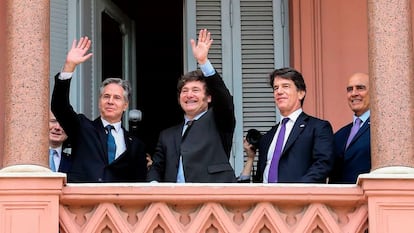Blinken, after his visit to Milei: ‘Argentina can count on us as they work to stabilise their economy’
The head of U.S. diplomacy arrives in Buenos Aires hours before the Argentine president travels to Washington to participate in the Conservative Action Conference hosted by Trump


The Argentine President, Javier Milei, has received U.S. Secretary of State, Antony Blinken, in Buenos Aires on Friday to deepen ties and increase trade between the two countries, according to the latter in a press conference at the Casa Rosada, the presidential residence. The visit of the head of U.S. diplomacy, a key official of Democrat Joe Biden’s administration who arrived in Argentina after the meeting of the G-20 foreign ministers in Brazil, has taken place just hours before Milei travels to Washington to participate in the Conservative Political Action Conference, the great meeting of the American radical right, which will feature former President Donald Trump.
However, neither Blinken nor the Argentine government made any public reference to the fact until a question from an American correspondent. Argentina’s foreign minister, Diana Mondino, didn’t confirm that Milei will meet with Trump in Washington, but the two will coincide and speak at Saturday’s forum. Milei, who has not appeared in public after the meeting, told the press gathered at Casa Rosada that “Argentina has decided to return to the side of the West, to the side of progress, to the side of democracy and, above all things, to the side of freedom.” This was the tone of the subsequent conference given by Blinken and Mondino.
Mondino stressed that the Argentine government hopes that both countries “can demonstrate shared values, basically democracy and freedom”. Blinken has continued in this line, and thanked the government of the far-right Milei for its strong condemnation of the Hamas attack on Israel last October, its commitment as a regional partner to ensure the security of Ukraine after the Russian invasion in January 2022, and as a reference in the Organization of American States (OAS) to “defend democratic values” against the authoritarian regimes that govern Cuba, Nicaragua and Venezuela.
“The people of Argentina can count on us as they work to stabilise their economy,” Blinken said. “We see extraordinary opportunity here in Argentina, but maybe most important, what’s so evident is that Argentina has what the world actually needs,” he said, referring to minerals used in batteries needed for the transition to renewable energy.
Regarding Argentina’s intention to dollarize the economy, the great plan promoted by Milei to curb inflation, which in January reached 254%, Blinken stated that he will wait to hear any plan, but he did not want to appraise it. The Secretary of State affirmed that it is “a decision for Argentina to make.”
Milei’s schedule, between the IMF and Donald Trump
On Thursday, Milei received the number two of the International Monetary Fund, Gita Gopinath, who welcomed “the important efforts” of the new Argentine government “to restore macroeconomic stability”. Gopinath spent two days in Buenos Aires where she also met with the Minister of Economy, Luis Caputo, and the authorities of the Central Bank. Her visit was “excellent”, according to the press release issued by the IMF on Thursday night, but the Fund’s deputy managing director stressed that the Milei government needs to “work pragmatically to build social and political support” to “ensure the durability and effectiveness of the reforms”.
It was not the first time that the IMF has asked Milei to open up to negotiate with the rest of the Argentine political spectrum. At the end of January, after the Government reactivated the payment plan that Peronism agreed in 2022 to repay the 44 billion that the IMF granted to the Government of Mauricio Macri in 2018, the Fund also celebrated the economic adjustment, but asked Milei to agree on his economic plan in Congress, which those days was debating the great scrapping law that the president presented at the beginning of his term. The law fell, Milei was left without emergency legislative powers or the almost 400 reforms that included the sale of some 40 state-owned companies, but the adjustment continued its course.
After a devaluation that shot inflation to 25% for December alone and 20% in January, the first full month of Milei’s government ended with a fiscal surplus, the first seen by an Argentine government in more than a decade. It was achieved after cuts in pensions, social benefits and subsidies, while the country is beginning to see tension in the streets. This week, the observatory of the Universidad Católica Argentina calculated that poverty rose from 49.5% in December to 57.4% in January. There are some 27 million poor people in a country with 46 million inhabitants, the worst figures since the 2002 crisis. The IMF was witness to the conflict that is beginning to grow in the streets of Buenos Aires.
After his meeting this Friday with one of Biden’s strongest officials, Milei will travel to the United States, where on Saturday he will be one of the highlights of the Conservative Political Action Conference (CPAC), the great meeting of American ultraconservatives, which these days began with the visit of Salvadoran President Nayib Bukele, and tomorrow will have Milei, the leader of the Spanish ultra-right, Santiago Abascal, and its top star: former U.S. President Donald Trump, as its main course.
Sign up for our weekly newsletter to get more English-language news coverage from EL PAÍS USA Edition
Tu suscripción se está usando en otro dispositivo
¿Quieres añadir otro usuario a tu suscripción?
Si continúas leyendo en este dispositivo, no se podrá leer en el otro.
FlechaTu suscripción se está usando en otro dispositivo y solo puedes acceder a EL PAÍS desde un dispositivo a la vez.
Si quieres compartir tu cuenta, cambia tu suscripción a la modalidad Premium, así podrás añadir otro usuario. Cada uno accederá con su propia cuenta de email, lo que os permitirá personalizar vuestra experiencia en EL PAÍS.
¿Tienes una suscripción de empresa? Accede aquí para contratar más cuentas.
En el caso de no saber quién está usando tu cuenta, te recomendamos cambiar tu contraseña aquí.
Si decides continuar compartiendo tu cuenta, este mensaje se mostrará en tu dispositivo y en el de la otra persona que está usando tu cuenta de forma indefinida, afectando a tu experiencia de lectura. Puedes consultar aquí los términos y condiciones de la suscripción digital.








































